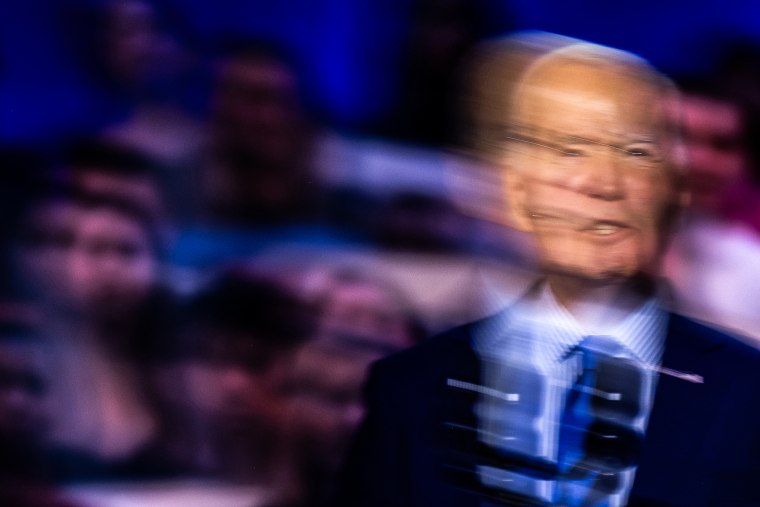WASHINGTON — A day after Robert Hur’s special counsel report declined to charge President Joe Biden with any crime — but pointed to evidence that he “willfully” kept classified materials — the White House is strongly disputing a discrepancy about an unlikely witness: the ghostwriter.
Mark Zwonitzer worked with Biden on two memoirs, “Promises to Keep,” which was published in 2007, and “Promise Me, Dad,” which came out in 2017. Hur alleges Biden shared classified information with the author while working on that second book that could “damage national security.”
Perhaps even more damaging than the allegations about the president’s memory outlined in the report, the accusation about sharing classified information might pose an even greater challenge for Biden, who called former President Donald Trump “totally irresponsible” for his alleged mishandling of classified documents.
During a press briefing on Friday, White House officials said parts of the report “don’t live in reality.”
“These are the president’s own personal writings,” said Ian Sams, a spokesman for the White House Counsel’s Office, referring to the information discussed with the ghostwriter. “Historically, going back to the beginning of the country, presidents keep diaries.”

In a hastily called news conference Thursday night, Biden was asked why he shared the information with the ghostwriter — and he flatly denied it.
“I did not share classified information,” Biden insisted. “Guarantee you, I did not.”
Pressed on why the special counsel claimed he did, the president responded: “He did not say that.”
In an interview Biden once conducted as part of the Audible audiobook version of “Promise Me, Dad,” Biden called Zwonitzer a “great guy” who “helped me organize.”
“I trust him with my life,” Biden said.
Zwonitzer has written other books, including co-authoring a biography of the musical Carter family. A biography on his publisher’s webpage says he is working on a documentary about the transcontinental railroad. The Emmys website indicates he’s been nominated for his work on biographical documentaries for public broadcasting.
In his report, Hur wrote that Biden’s ghostwriter initially deleted audio recordings he had of his conversations with Biden after he learned of the special counsel’s investigation. Hur said he considered charging the ghostwriter with obstruction of justice, but decided against it because he thought there was insufficient evidence for a conviction.
The ghostwriter offered “plausible, innocent reasons for why he deleted the recordings,” according to the Hur report, and cooperated with investigators, turning over his computer and external hard drive.
Zwonitzer did not return messages seeking comment.
The special counsel’s report explicitly alleges that “Mr. Biden shared information, including some classified information, from these notebooks with his ghostwriter.”
“I had written a long memorandum to President (Barack) Obama (about) why we should not be in Afghanistan,” Biden said, calling it “private” communication between him and Obama — not “classified.”
“I didn’t read it to (the ghostwriter),” Biden added.
The report claims the opposite: “Mr. Biden sometimes skipped over presumptively classified material and warned his ghostwriter the entries might be classified, but at least three times Mr. Biden read from classified entries aloud to his ghostwriter nearly verbatim.”
Still, the report hedges on whether the specific disclosure of that information rose to the level of a crime — or whether Biden’s intent could be proven beyond a reasonable doubt.
“Mr. Biden should have known that by reading his unfiltered notes about classified meetings in the Situation Room, he risked sharing classified information with his ghostwriter,” the report argues. “But the evidence does not show that when Mr. Biden shared the specific passages with his ghostwriter, Mr. Biden knew the passages were classified and intended to share classified information.”
According to the report, Biden saved notebooks from his time as vice president that contained classified information, using them to help Zwonitzer organize his memoir — sometimes reading from them verbatim for more than an hour at a time despite Biden knowing the author did not have a security clearance. The report said federal investigators found a box labeled “mark Z” and that a recorded conversation with Zwonitzer in 2017 included Biden telling the ghostwriter that he’d “just found all the classified stuff downstairs,” referring to a home he was renting in Virginia. Still, the report said no classified information turned up in the memoir and FBI agents recovered the notebooks from the office and basement den in Biden’s Delaware home in January 2023.
Sams, the White House counsel’s office spokesman, highlighted another passage deeper in the report that lays out the special counsel concluded “that the evidence does not establish that Mr. Biden willfully disclosed national defense information to Zwonitzer” because jurors would have reasonable doubts about whether Biden knew he was sharing classified information with Zwonitzer and whether “he intended to do so.”
Biden’s attorneys, Richard Sauber and Bob Bauer, also forcefully pushed back on Hur’s assertion that Biden shared classified information.
Specifically responding to the allegation about the ghostwriter, the attorneys in a letter highlight that Biden was referring to his handwritten letter to Obama about Afghanistan, which Biden viewed as “sensitive and private communication,” but not classified. The attorneys accuse Hur of wrongly concluding that Biden was referring to marked classified documents about Afghanistan.
“We believe that an accurate recitation of the evidence on this point would recognize the strong likelihood that the President was referring in the recording to his private handwritten letter to President Obama — the one mentioned on this recording immediately after the eight words that you are focused on — rather than the marked classified Afghanistan documents discovered in the Wilmington garage.”
